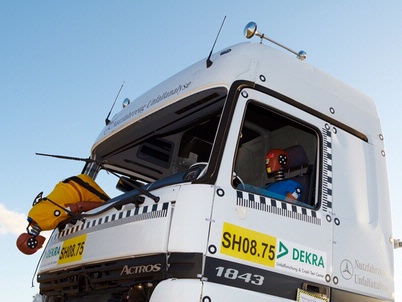Analyzing real-life accident data from the road and using it to draw conclusions for road safety – that is the day-to-day work of DEKRA Accident Research, which is celebrating an anniversary in 2018. The expert organization founded this department 40 years ago. “The work for road safety has been enshrined in the Articles of Association as a purpose ever since DEKRA was first formed. The work performed by DEKRA Accident Research plays a central role here,” says Clemens Klinke, member of the Management Board of DEKRA SE and responsible for the Automotive business unit.

- Analysis of real-life accident data for concrete recommendations
- DEKRA accident reports constitute an important part of the database
- Close cooperation with the DEKRA Crash Test Center
The work of DEKRA Accident Research is just as multifaceted as the nature of real-life accidents. “It ranges from minor collisions to major pile-ups and from fire tests to crash barrier failures. It comprises driving dynamics tests and the analysis of individual accidents as well as compiling and evaluating our own and external accident databases,” explains Jens König, head of DEKRA Accident Research. “The fact that our work is closely linked with our Crash Test Center on the one hand and our accident analysts on the other is unique at DEKRA and constitutes a great benefit to us.” DEKRA’s accident analysts operate throughout Germany and are commissioned by the police, courts and public prosecution departments to prepare reports on real-life accidents. These reports constitute an important part of the database that the accident researchers use for their work.
DEKRA Accident Research has contributed its expertise to numerous research projects since 1978. “Examples include the ‘Theseus’ project for the safety of fuel tankers, a detailed analysis of fire incidents in coaches, a research project on the danger that pedestrians and cyclists are exposed to when trucks turn right and a study that compared different methods of rescuing occupants trapped in passenger cars, to name but a few,” says Jens König. Research projects at EU level have also been playing an increasingly important role over the last 15 years. These include, for example, the “APROSYS” project for improving passive safety, the “Safety in Motion (SIM)” project on motorbike safety and, most recently, the “SafetyCube” project that aims to make road safety measures systematically comparable in terms of costs and benefit throughout Europe.
“Our extensive databases, which we built up over the past decades, are one of the most important elements of our work,” says Jens König. “Our accident database, for example, contains information on several thousands of accidents that happened between 1997 and today. It is updated continuously. The database contains more than 400 individual parameters for each accident, which allows us to evaluate the data in great detail and use it to analyze various different questions.”
The clients of DEKRA Accident Research include vehicle manufacturers and suppliers as well as authorities and associations. However, a large part of the work also flows into DEKRA’s own publications, for example traffic observations on the topic of distraction by smartphones in road traffic and the interactive online map on the topic of “Vision Zero” (www.dekra-vision-zero.com). “Accident Research also contributes significantly to the preparation of the DEKRA Road Safety Report that has been published every year since 2008,” says Management Board member Clemens Klinke. Each report analyzes an umbrella topic from the area of road safety with regard to vehicle technology, infrastructure and the human factor and provides food for thought and concrete recommendations for action to politicians, traffic experts, manufacturers, scientific institutions and associations. It is also meant to act as an essential companion for all road users. DEKRA Accident Research already made significant contributions to preparing the precursors to the reports, the “Technische Mängel” [Technical Defects] journals, since the 1970s.
Through the involvement of DEKRA Accident Research in the DEKRA Safety Day and other public events as well as extensive lecturing activities, the findings of DEKRA Accident Research are made accessible to the public first hand and thereby make an important contribution to accident prevention.
A look at the accident statistics over the last decades reveals a long success story: The number of traffic fatalities decreased despite the larger number of vehicles on the roads and an increase in traffic density. The increases of the past years show that this trend is by no means a given: “We must not rest on the successes of the past as new technologies and changes in society constantly confront us with new challenges. We must not let our efforts to increase road safety slide,” emphasizes DEKRA Management Board member Klinke. “This is why the work of DEKRA Accident Research will continue to play an important role for us in the future.”